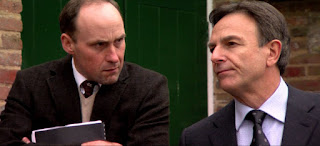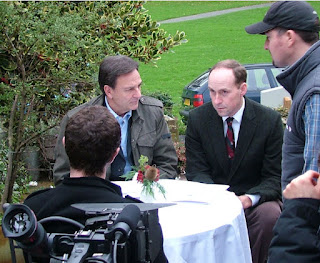 (Interview with 'Ambleton Delight' cast member Andrew Elias)
(Interview with 'Ambleton Delight' cast member Andrew Elias)Following on from our interview with leading actor Jos Lawton, we have asked supporting actor Andrew Elias, who provided a memorable performance as Town Clerk Colin Wilkinson along side the Mayor played by Brian Capron, regarding practical ways of making life easier for an actor on a low budget film.
What do you need from a director prior to filming?
I really appreciate being able to sit down with the director to discuss my character. It sounds obvious, but it’s amazing how many directors send supporting actors a character description, and then expect them to turn up on set and ‘act’ without any further character discussion, whilst focusing entirely on the leads. Every director works differently, but being able to sit down (even just for five minutes) and chat about the character is essential. It helps the actor know what the director’s expectations of both the actor and the character are. It also means that there doesn’t need to be any ‘what is my motivation?’ questions on set during filming, which can be infuriating to a director trying to stick to a tight schedule.

What do you need from a director on set?
I like to feel that my contribution to the production, no matter how small, is integral to telling the story and fulfilling the director’s vision. A great director is one that makes an actor feel important no matter how small the part. Contrary to popular belief, most actors are insecure about their abilities, so a bit of praise after a shot is also really helpful. I personally liked to be pushed to my limits as an actor. I worked with a director years ago who was making me repeat the same scene over and over, and the rest of the cast said to him ‘Give him a break’, to which he replied: ‘I will only push Andrew as far as I think he can take it, and he’s got a little way to go yet’. How right he was.

What do you need from a director afterwards?
Evaluation is always helpful, especially in a social setting (a pub!) away from set, where you can both relax and discuss informally how the scenes went.
What should they not do?
Break down in tears, smash things up or hit people. Seriously...it happens, and it doesn’t inspire confidence! A pet hate of mine is when directors say ‘do it like this’ and do a specific action, or ‘say it like this’ and adopt a strange accent/intonation. Not only does this make a mockery of the casting process, it is also incredibly soul destroying for an actor and has nothing to do with building character. As I’ve already said, I do liked to be pushed, but there’s a big difference to being stretched as an actor and being asked to do an impersonation of the director.
What can filmmakers/producers do to make your job easier?
Detailed call sheets and frequent correspondence are incredibly helpful. This helps concrete the feeling of ‘belonging’ rather than just ‘passing through’.

What should actors do/not do to make filmmakers' job easier?
Where do we start? Well, Spencer Tracy famously said that to be a good actor you merely have to learn lines and not bump into the furniture! Patience, flexibility and a good sense of humour go along way on a film set. It’s also very important to know where you, as a performer, stand in the ‘pecking order’ on set. For example, the Star can make Big suggestions, a Supporting Actor can make Small suggestions, but an Extra should keep schtum! Patrick Tucker’s Secrets of Screen Acting outlines basic, accepted, screen acting etiquette and is an essential read for actors wishing to avoid any faux pas on set.
For more, check out Andrew Elias' insightful acting blog: http://andrewelias.blogspot.com/





"it’s amazing how many directors send supporting actors a character description, and then expect them to turn up on set and ‘act’ without any further character discussion, whilst focusing entirely on the leads."
ReplyDeleteI think this guy is choosing to work for the wrong directors! I don't know anyone like that.
To be fair, they are few and far between...but it is amazing that it happens at all!
ReplyDeleteIt appears I'm not alone. I read this today in 'If Chins Could Kill' by Bruce Campbell:
ReplyDelete'I once heard that Robert DeNiro lived with a steel-working family for six weeks in order to prepare for his role in The Deer Hunter. I've watched interviews with actors who tell wrenching stories of how hard it was to "shake" a character after filming was complete. That's all well and good, but ninety-nine percent of the time an actor is lucky to know what scene is being shot.
Of course, some films have rehearsals where you can work out blocking and discuss every nuance of your character ad nauseum. Since my first film in 1979, I've rehearsed like this maybe two times. Most film projects, and certainly of all TV, simply don't have the time for it.'